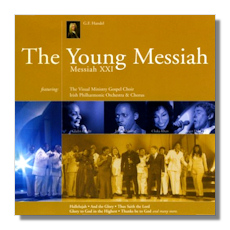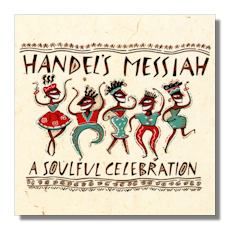
The Internet's Premier Classical Music Source
Related Links
- Handel Reviews
- Latest Reviews
- More Reviews
-
By Composer
-
Collections
DVD & Blu-ray
Books
Concert Reviews
Articles/Interviews
Software
Audio
Search Amazon
Recommended Links
Site News
 CD Review
CD Review
George Frideric Handel

Soul Messiahs
The Young Messiah - Messiah XXI
- Gladys Knight
- Chaka Khan
- Jeffrey Osborne
- Roger Daltrey
Visual Ministry Gospel Choir
Irish Philharmonic Orchestra & Chorus/Frank McNamara
Foreign Media Group 7566 72:52
Also available on DVD: Amazon - UK - Germany - Canada - France - Japan - CD Universe


Handel's Messiah: A Soulful Celebration
- Stevie Wonder
- Al Jarreau
- Vanessa Bell Armstrong
- Dianne Reeves
- Patti Austin
- Tremaine Hawkins
- Tevin Campbell
- Daryl Coley
- Lizz Lee
- Chris Willis
- Howard Hewitt
Take 6
Boys Choir of Harlem
Sounds of Blackness
Richard Smallwood Singers
The Yellowjackets
Commissioned
The Clark Sisters
Mike E., et al.
Warner Reprise Records 56980-2 76:06
Summary for the Busy Executive: Fascinating. Great concept. Flawed execution.
I hate it when people say, "Beethoven would have loved" whatever abominable pop arrangement had been made of his work. But I hope Handel – a composer who loved to cause a sensation – would have enjoyed these two albums, essentially translating Messiah into soul, gospel, R&B, and a bit of jazz.
I heard about The Young Messiah and immediately began to imagine Gladys Knight's voice in the contralto arias. I had to hear it. What would a gospel choir make of Handel's mighty choruses? I don't think it's a far-fetched idea. If nothing else, the Good Ol' Hallelujah chorus has burrowed itself deeply into pop culture. People who have never heard the entire oratorio or any other number can sing this one in parts.
These albums take different approaches to the work. The Young Messiah works off an arrangement of several numbers – the plums (ending with the Hallelujah chorus, of course) – by Frank McNamara. This allows the swifter, melismatic choruses (the ones with long chains of quick notes) like "And He shall purify" to be played straight by a classical choir. Unfortunately, the Irish Philharmonic Chorus is definitely a weak-sister group and, among other things, smears all their runs. They deaden every chorus they touch. The Visual Ministry Gospel Choir shows them up time and time again in their rhythmic élan and in their ability to communicate. They demand you pay attention. The orchestra rises no higher than okay. Of the four soloists, Roger Daltrey, whiney and out-of-tune, counts as an unmitigated disaster who has no business on the same stage as the other three. I'd love to sing with Chaka Khan and Gladys Knight, too, but I'd have the sense not to take a solo. I'd be content with backing them up, an extra Pip. Gladys Knight tries to do her numbers relatively straight, but she has neither the style nor the breath. She respects the material to the point where it seems to paralyze her. Fortunately, the sheer sound of her voice saves her. This is one of the great American voices. Jeffrey Osborne gets into the soul-gospel delivery and lets you know that a soul Messiah is a viable concept. However, the standout here is Chaka Khan, who just lets herself go, delivering a brilliant "The trumpet shall sound." Unfortunately, McNamara has confined her to just two numbers.
The Soulful Celebration, on the other hand, uses arrangements by outstanding individual producers and essentially different personnel for each "plum." The moving spirit behind it all seems to be Mervyn Warren, who does several arrangements and helped produce the album overall. We get a an overstuffed cast of stellar singers, the royalty of r & b and gospel, with some jazz guest stars. This has individually wonderful tracks as well as a few weak ones, but no overarching vision (which, as the McNamara shows, isn't necessarily an asset).
The overture, arranged by several hands, stuns you with its imagination. Subtitled "a partial history of Black music," it takes us from African drumming to hip-hop and house, making Handel's fugal subject speak in pitch-perfect accents of spiritual, rag, swing, and so on.
The solos are all at least quite good indeed, but it struck me how almost every one of them has come under the influence of Aretha Franklin, the titanic force not actually in front of the studio mike. She's like the mother ship broadcasting to her satellites. Not everybody is so touched and nobody merely imitates. Nevertheless, it's her version of soul almost everybody, male or female, taps into.
"Every valley" samples Leppard's crisp performance with the English Chamber Orchestra. "And the glory of the Lord" moves to a reggae beat, elegantly accented by a Dianne Reeves solo. "And He shall purify" gets reflected in a modern gospel mirror. The nations rage in a quick be-bop tempo, cooled a bit by a smooth and precise Al Jarreau.
However, in a mix of wonderful performances, one track stands out: Stevie Wonder and Take 6 (arrangement by Take 6's Cedric Dent) doing "Oh Thou that tallest" in jaw-dropping, Ellingtonian harmonies. The harmonies amaze you. The group's ability to sing them in tune and with stylish verve makes you believe in miracles.
The whole thing is capped off, naturally, with the Hallelujah chorus. Everybody on the disc so far participates, as well as (as they say) special guest stars: Chaka Khan, Gladys Knight, Jeffrey Osborne, Johnny Mathis, Phylicia Rashad, all led by Quincy Jones. Everyone is part of the giant choir. Although I generally didn't care for the tracks featuring raps, since I'm off rap in general, it's only two tracks of the sixteen.
These albums aren't for everyone. I can easily imagine classical listeners finding it over-the-top and kitschy. I'm such a fan of most of these people, I'm enthralled, and, as I say, at least some of the arrangements strike me as brilliant takes on familiar things already brilliant. If you want to try only one, I'd go with Soulful Celebration first. Young Messiah requires more empathy with the music of the Black church.
Copyright © 2010, Steve Schwartz.



















